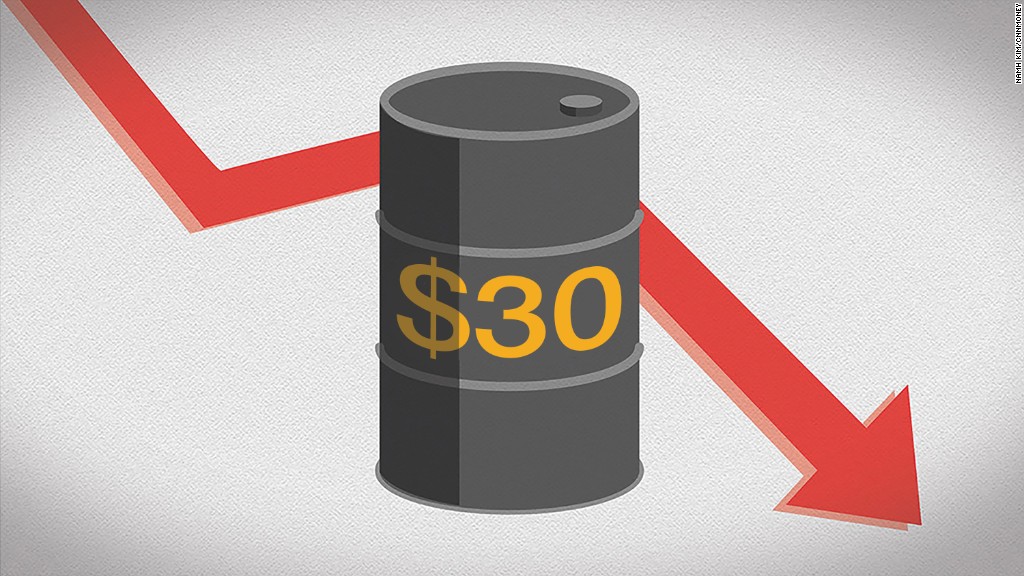
These days it's pretty easy to know which way the stock market will go: whichever way oil prices are going.
Stocks and crude oil have been glued at the hip in 2016 -- for better or worse. It was a scary linkage last week when oil prices plummeted to $26 a barrel, dragging the S&P 500 to levels unseen since April 2014. But then oil spiked a ridiculous 23% late last week, carrying stocks sharply higher.
The S&P 500 is now almost perfectly correlated to the price of oil, a CNNMoney analysis has found. It's a rather peculiar phenomenon given that oil prices and stocks has had virtually no correlation over the past decade.
"We're not in an environment where fundamentals are driving stocks. Oil is driving sentiment," said David Mazza, head of research for SPDR ETFs and State Street Global Advisors Funds.
That sentiment has been pretty bleak so far this year. Both the Dow and the S&P 500 are down about 8%. Even CNNMoney's Fear and Greed index has been flashing "extreme fear" lately.
Related: What has to happen for stocks to go back UP
Oil is hardly a proxy of the U.S. economy, so this kind of a correlation is highly unusual. In fact, energy makes up less than 3% of the U.S. economy, according to the Bureau of Economic Analysis.
So, for America's six-year-old bull market in stocks to get back on track, stocks will need to decouple from oil and focus on economic fundamentals. For that to happen, oil prices need to get less volatile.
"Once oil prices stabilize -- hopefully at a relatively low price for those of us who like to drive -- the stock market will move on to other issues," said Ed Yardeni, president of investment advisory Yardeni Research.
Here's why investors are so intensely focused on cheap oil:
-- Falling prices often signal softness in demand that can foretell an economic slowdown. However, many experts believe this oil crash is mostly being caused by the epic supply glut, not weak demand.
-- Cheap oil is causing U.S. oil production to cool off, weighing on profits from energy companies and the economies of states like Texas and North Dakota.
-- The threat of billions of dollars of oil loans imploding raises the risk of trouble in the banking sector.
-- Chaos in the oil patch is causing junk bond yields to spike, especially in the energy sector.
-- Russia, Venezuela, Brazil and other countries that rely on oil exports are slumping badly, causing concern about a new emerging market debt crisis.
-- Falling energy prices and the global stock market reaction have cast fresh doubt on whether the Federal Reserve will be able to raise interest rates this year.
Related: Why you should worry about cheap oil
Yardeni believes fundamentals will ultimately prevail. After all, the oil plunge is great for the real driving force of the American economy: consumers. Indeed, average U.S. gas prices have spent 26 consecutive days below $2 per gallon, according to AAA.
"When home prices collapsed, there were few winners. Everyone's wealth was decimated. But this is an automatic windfall for oil users," Yardeni said.
Perhaps the market's fixation with oil prices will be broken by earnings season, which is kicking into high gear this week. Strong corporate profits -- especially from consumer-facing companies likely to benefit from cheap oil like Apple (AAPL), Ford (F), American Airlines (AAL)and Chipotle (CMG) -- could allow Wall Street to refocus on the economic upside to cheap oil.
"Short-term, markets may move with oil prices, but longer term lower oil prices will help boost growth. The pain comes first, but the broad gains come later," said Kate Warne, investment strategist at Edward Jones.


